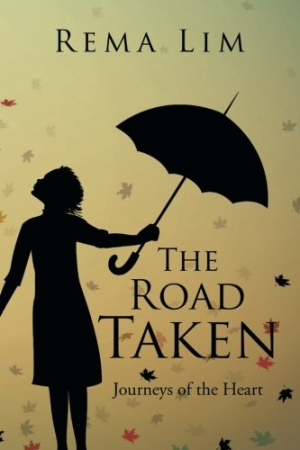The Road Taken
Journeys of the Heart
A personal account of a full life, The Road Taken is a memoir that captures all of the highlights.
Through a series of spare vignettes, the memoir The Road Taken revisits Rema Lim’s milestones. Black-and-white family photographs reveal the past with nostalgia.
Born to Indian parents in the 1950s, Lim and her siblings followed their father, an English teacher, to his new post in Malaya. So begins a life that is at first viewed as a “dream within a dream.” From childhood impressions of school to a visit back to India, frequent moves, adolescence, university, marriage, motherhood, and widowhood, the book shares unruffled idylls in its early sections. Elegant surfaces reveal a childhood with greater freedom to roam and less technology.
At times the rose-colored selectivity results in a lack of dimension. Gradually, despite the initial tone of wonderment, reality seeps in. Fleeting mentions of poverty—seen in other children “from the estates” and in the Tamil population—appear, and Malaya’s landscape and general history are established for context.
Bullying and racial tension between locals and Indians are hinted at in “Adolescence and Selangor,” but most incidents are glossed over as unpleasantries. Race resurfaces but is not entirely explored in “University of Malaya,” a 1970s account of Lim finding love with Chee Seng, a Chinese academic; they experience pushback from the Chinese and Indian communities.
Proofreading errors, repetition, awkward transitions between paragraphs, and impassioned tangents—including one on intermarriage and the hypocrisy of Indian men—interrupt the flow of the work. Timelines compress and speed up: the path from Lim’s marriage in 1976 to Chee Seng’s cancer diagnosis in 2010 spans eight pages. When the subject turns toward Lim’s Christian faith and the raw grief she felt in the wake of her husband’s death, the writing frays.
The book’s later sections seem like they are part of a different work; these parts are conversational, prone to summarizing, and are sometimes punctuated with unexpected forays into other subjects—like revelations of Chee Seng’s nature and the admission of having lived in his shadow. Lim’s affecting admissions are simultaneously eye-opening and reluctant, taking on a diarist’s quality. Still, Lim’s quiet resilience stands out. A gradual portrait emerges of a woman who, by her own estimation, remained “invisible,” yet found solace. Amid the tidal sweep of decades, she was kept afloat by faith and love for language.
As a personal album, The Road Taken hits all the major highlights. As a work for a wider audience, it’s an encouraging aperitif that affirms God’s wisdom through joy and pain.
Reviewed by
Karen Rigby
Disclosure: This article is not an endorsement, but a review. The publisher of this book provided free copies of the book and paid a small fee to have their book reviewed by a professional reviewer. Foreword Reviews and Clarion Reviews make no guarantee that the publisher will receive a positive review. Foreword Magazine, Inc. is disclosing this in accordance with the Federal Trade Commission’s 16 CFR, Part 255.

